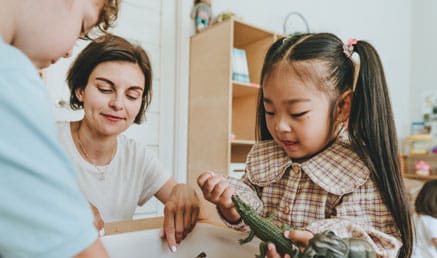
“It’s our polite nudge in the ribs to help you and your team stay organised and on task.”
This week’s subject is: Self-Regulation
Element 5.2.2: Each child is supported to regulate their own behaviour, respond appropriately to the behaviour of others and communicate effectively to resolve conflicts.
Element 5.2.2 focuses on how the Service and educators support and empower children to develop and build on their skills and ability to regulate their emotions to support them to adapt in a range of social situations and foster positive relationships and mental wellbeing.
What strategies do your educators implement to support children to identify and regulate their emotions, understand the emotions of others and the impact of their behaviour?
Self-regulation becomes increasingly important as children move through childhood. They become more mindful of the way others interact with them, and at the same time develop understandings of how their actions affect the way others feel and behave. Educators work with young children to promote and model positive ways to relate to others. This includes role modelling and supporting children to convey and construct messages with purpose and confidence, for example when expressing needs, resolving conflict or responding to the behaviour of others (Guide to the NQF).
Educators use a range of strategies to support children in building positive relationships and effectively managing social situations. Providing children with a safe, supportive and responsive environment and interactions will support children in developing the skills to self-regulate. Educators should be in touch with, and responsive to, children’s individual needs and also be able to model regulating their own behaviour in response to challenging or stressful situations. Educators are empathetic, consistent and responsive to the differing ways in which individual children respond to new or difficult situations, recognising that there are both strengths and challenges for each child to effectively deal with the pressures of everyday routines, interactions, relationships, play and learning.
In collaboration with your team, consider the below reflective questions to assist educators in deepening their understanding of their role in fostering self-regulation in children and identify areas for growth and improvement in their practice. By continually reflecting on their approaches and making adjustments, where required, educators can create a supportive environment where children can thrive and develop essential self-regulation skills to help set them up for positive lifelong learning and mental wellbeing:
-
- How do we model self-regulation in our own responses, behaviour and interactions with colleagues, children and young people?
- How do we support and encourage children to appropriately contribute to shared decisions in relation to the program and routines?
- How do we document and ensure that it is evident that our program and routines demonstrate how planned and spontaneous experiences support children to develop and practice the skills required to participate in group discussions and negotiate shared decision making with their peers and educators?
- How do we support children to navigate their friendships, negotiate and resolve conflicts appropriately and effectively?
- How do we share knowledge and information with families about positive behaviours and emotional literacy?
- How do we ensure consistency when responding to children and young people’s behaviour to ensure that expectations are clear and transparent across the Service?
- In what ways does the layout of the physical environment and resources support children in maintaining positive interactions and socially acceptable behaviours with peers and educators?
- How do we respond to children’s emotional outbursts or challenges in a nurturing and empathetic manner that promotes self-regulation?
- How do we ensure that the strategies that we implement to foster self-regulation in children are age and developmentally appropriate?
- How do we scaffold children’s self-regulation skills, starting from simple tasks to more complex challenges?
- How do we promote a sense of autonomy and empowerment in children as they learn to regulate their own behaviour?
- How do we create a supportive and nurturing environment where children feel safe to explore and express their emotions?
- How do we enhance our skills and knowledge and expand on strategies to positively guide children’s behaviour?
- How do we support children with diagnosed behavioural and social conditions to manage their behaviour in appropriate, practical and realistic ways?
- How are the routine and transitions planned with the intention of minimizing children’s anxiety and stress? Do we allow for flexibility to allow educators respond to children’s varying needs?
- Do we consistently offer a variety of materials, equipment and experiences that engage children’s interests, are culturally responsive and create a sense of belonging and security?
Resources:
ACECQA- Supporting children to regulate their own behaviour
Self-regulation: A foundation for wellbeing and involved learning
Emotional literacy and self-regulation
Resources for families:
Raising Children Network- Self-regulation
Developing your child’s emotional literacy
School age- Developing coping skills
Positive approaches to guiding behaviour
Within System7 go to Quality Area 5/Module 6 to submit self-assessment notes and if required, open a QIP issue if you identify any areas of improvement.
The Childcare Centre Desktop has a range of resources to assist services with behaviour guidance. These include Behaviour Guidance Policy, Behaviour Guidance Procedure, Behaviour Guidance Audit, Behaviour Guidance Plan, Behaviour Guidance Biting Guide and much more.
Resources, NQS Element, Regulation and System7 links:
Childcare Centre Desktop – Childcare Centre Desktop
National Quality Standard – QA5 / Element: 5.2.2
National Regulations – Part 4.5 Relationships with children & 168
System7 Module – QA 5/ Module 6
If you have any questions send us a note via the Contact page here!




